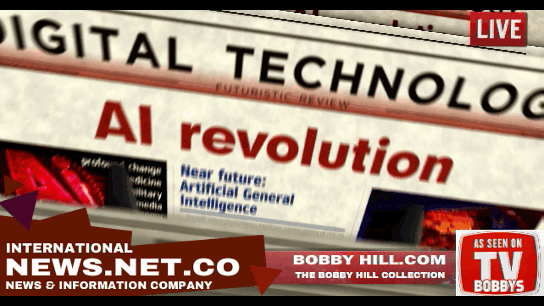-
play_arrow
NEWS NETWORK COMPANY RADIO NEWS NETWORK COMPANY RADIO
-
 play_arrow
play_arrow
MR. NEWS PODCAST NEWSCAST MR. NEWS
Technology news in October 2025 has been shaped by rapid innovation, breakthroughs in artificial intelligence, major corporate changes, and industry-defining hardware launches. MR. NEWS presents an in-depth, newspaper-style feature blog examining the state of technology this year, highlighting developments that are rewriting the rules of science, business, and daily life.
Artificial Intelligence Surges Ahead
Artificial intelligence has taken center stage in several domains with transformative impacts. OpenAI finalized a deal that values it at $500 billion, putting it ahead of SpaceX and making it the world’s most valuable privately held company. Meta announced a move to insert ads based on users’ AI chat interactions, and Palantir’s government business helped sustain its remarkable 1,700% stock market rise since its NYSE debut, largely due to advances in AI infrastructure. Yet, leading industry voices warn of social disruption: OpenAI’s Sora, for example, sparked concerns by generating ultrarealistic videos depicting events that never occurred, raising urgent questions about the spread of disinformation. Amazon’s ecosystem is also embracing AI, with new Alexa+ devices leveraging generative models for seamless home integration.
Even as AI climbs, industry leaders caution against unchecked exuberance. Jeff Bezos called the current AI investment climate an “industrial bubble” but believes the long-term societal benefits will be “gigantic” as the technology matures and integrates into global sectors.
Hardware Launches and Fierce Competition
October remains packed with high-profile tech launches, expected ahead of the busy holiday season. Samsung is set to debut the world’s first trifold smartphone, new smart glasses, and an XR headset meant to rival Apple’s Vision Pro. Microsoft is showcasing its Surface Laptop 8 with advanced AI chips powering new hardware. Meanwhile, Apple, having removed ICE tracking apps in response to legal threats from President Trump’s administration, prepares for a fall launch event dominated by upgraded iPad Pro and Vision Pro devices.
Microsoft, a leader in the AI arms race, is dramatically increasing the price of its ultimate Xbox Game Pass to $29.99 per month and developing its own data center chips adapted for advanced machine learning workloads. Amazon’s response: a new “price-conscious” grocery brand aimed at broadening its consumer base, with most items selling for under $5.
Tech Industry Shifts: Crypto, Blockchain, and Cloud
Crypto technology is becoming mainstream, with World Liberty Financial (Trump’s crypto venture) expanding debit card and tokenized commodity offerings. Stablecoins are gaining traction among small businesses, promising reduced transaction fees and innovative rewards systems for customers. Blockchain is instrumental not only in finance, but also in industries such as logistics, healthcare, and entertainment, anchoring security and transparency.
AI infrastructure deals by tech giants like Nvidia have sent its market valuation soaring past $4.5 trillion—a testament to investor confidence in future cloud computing and generative AI applications. Space-based solar farm startups in California began testing satellites that beam energy to the ground using lasers, hinting at a revolution in how Earth harnesses power.
The Rise of Extended Reality (XR) and Beyond
Virtual reality (VR), augmented reality (AR), and mixed reality (XR) are quietly revolutionizing daily experiences as well as enterprise solutions. With lighter headsets and improved motion tracking, VR and AR have expanded into gaming, therapy, and workforce training. New AR glasses and mobile integration promise to transform retail, real estate, and education by bridging digital and physical worlds. Extended reality platform launches from Samsung and Apple this month may catalyze broader adoption.
Regulatory Battles and Social Implications
Technology’s breakneck pace faces pushback from regulators and social watchdogs. Disney issued a cease and desist letter to Character.AI for using copyrighted characters, continuing battles over AI-generated content. The Trump administration pressed Apple to take down the ICEBlock app, intensifying legal pressures around information platforms.
Meanwhile, lawsuits against automakers like Tesla spotlight the risks of over-engineered systems; a Cybertruck’s electronic doors were cited in a legal complaint following a tragic accident.
Market Trends and Future Directions
Despite inflation and Federal Reserve caution, tech stocks remain a bright spot for investors seeking innovation and growth. However, rising industry spending—especially fueled by artificial intelligence—has executives rethinking budgets and returns, wary of overspending amid fierce competition.
Looking forward to 2025 and beyond, emerging technologies such as quantum computing, blockchain, biotechnology, edge computing, and sustainable tech (including green energy and carbon capture) promise further disruption. India and other global economies are pushing to lead the adoption of these tools, signaling a digital revolution with near-universal implications for business, society, and everyday life.
The Technology Pulse in October 2025
From moonshot startups to trillion-dollar infrastructure investments, the future comes faster than ever as AI, blockchain, XR, and next-gen hardware rewrite technology’s rulebook. As the pace continues to accelerate, MR. NEWS remains on the pulse—bringing the stories shaping tomorrow to newsrooms, boardrooms, and households worldwide.
Artificial Intelligence Surges Ahead
Artificial intelligence has taken center stage in several domains with transformative impacts. OpenAI finalized a deal that values it at $500 billion, putting it ahead of SpaceX and making it the world’s most valuable privately held company. Meta announced a move to insert ads based on users’ AI chat interactions, and Palantir’s government business helped sustain its remarkable 1,700% stock market rise since its NYSE debut, largely due to advances in AI infrastructure. Yet, leading industry voices warn of social disruption: OpenAI’s Sora, for example, sparked concerns by generating ultrarealistic videos depicting events that never occurred, raising urgent questions about the spread of disinformation. Amazon’s ecosystem is also embracing AI, with new Alexa+ devices leveraging generative models for seamless home integration.
Even as AI climbs, industry leaders caution against unchecked exuberance. Jeff Bezos called the current AI investment climate an “industrial bubble” but believes the long-term societal benefits will be “gigantic” as the technology matures and integrates into global sectors.
Hardware Launches and Fierce Competition
October remains packed with high-profile tech launches, expected ahead of the busy holiday season. Samsung is set to debut the world’s first trifold smartphone, new smart glasses, and an XR headset meant to rival Apple’s Vision Pro. Microsoft is showcasing its Surface Laptop 8 with advanced AI chips powering new hardware. Meanwhile, Apple, having removed ICE tracking apps in response to legal threats from President Trump’s administration, prepares for a fall launch event dominated by upgraded iPad Pro and Vision Pro devices.
Microsoft, a leader in the AI arms race, is dramatically increasing the price of its ultimate Xbox Game Pass to $29.99 per month and developing its own data center chips adapted for advanced machine learning workloads. Amazon’s response: a new “price-conscious” grocery brand aimed at broadening its consumer base, with most items selling for under $5.
Tech Industry Shifts: Crypto, Blockchain, and Cloud
Crypto technology is becoming mainstream, with World Liberty Financial (Trump’s crypto venture) expanding debit card and tokenized commodity offerings. Stablecoins are gaining traction among small businesses, promising reduced transaction fees and innovative rewards systems for customers. Blockchain is instrumental not only in finance, but also in industries such as logistics, healthcare, and entertainment, anchoring security and transparency.
AI infrastructure deals by tech giants like Nvidia have sent its market valuation soaring past $4.5 trillion—a testament to investor confidence in future cloud computing and generative AI applications. Space-based solar farm startups in California began testing satellites that beam energy to the ground using lasers, hinting at a revolution in how Earth harnesses power.
The Rise of Extended Reality (XR) and Beyond
Virtual reality (VR), augmented reality (AR), and mixed reality (XR) are quietly revolutionizing daily experiences as well as enterprise solutions. With lighter headsets and improved motion tracking, VR and AR have expanded into gaming, therapy, and workforce training. New AR glasses and mobile integration promise to transform retail, real estate, and education by bridging digital and physical worlds. Extended reality platform launches from Samsung and Apple this month may catalyze broader adoption.
Regulatory Battles and Social Implications
Technology’s breakneck pace faces pushback from regulators and social watchdogs. Disney issued a cease and desist letter to Character.AI for using copyrighted characters, continuing battles over AI-generated content. The Trump administration pressed Apple to take down the ICEBlock app, intensifying legal pressures around information platforms.
Meanwhile, lawsuits against automakers like Tesla spotlight the risks of over-engineered systems; a Cybertruck’s electronic doors were cited in a legal complaint following a tragic accident.
Market Trends and Future Directions
Despite inflation and Federal Reserve caution, tech stocks remain a bright spot for investors seeking innovation and growth. However, rising industry spending—especially fueled by artificial intelligence—has executives rethinking budgets and returns, wary of overspending amid fierce competition.
Looking forward to 2025 and beyond, emerging technologies such as quantum computing, blockchain, biotechnology, edge computing, and sustainable tech (including green energy and carbon capture) promise further disruption. India and other global economies are pushing to lead the adoption of these tools, signaling a digital revolution with near-universal implications for business, society, and everyday life.
The Technology Pulse in October 2025
From moonshot startups to trillion-dollar infrastructure investments, the future comes faster than ever as AI, blockchain, XR, and next-gen hardware rewrite technology’s rulebook. As the pace continues to accelerate, MR. NEWS remains on the pulse—bringing the stories shaping tomorrow to newsrooms, boardrooms, and households worldwide
Written by: NEWS NET CO
Similar posts
Copyright NEWS.NET.CO - HOST: MR. NEWS




Post comments (0)